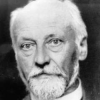Ludwig Quidde

Ludwig Quidde
Ludwig Quiddewas a German pacifist who is mainly remembered today for his acerbic criticism of German Emperor Wilhelm II and a politician. Quidde's long career spanned four different eras of German history: that of Bismarck; the Hohenzollern Empire under Wilhelm II; the Weimar Republic; and, finally, Nazi Germany. In 1927, he was awarded the Nobel Peace Prize...
NationalityGerman
ProfessionCritic
Date of Birth23 March 1858
CountryGermany